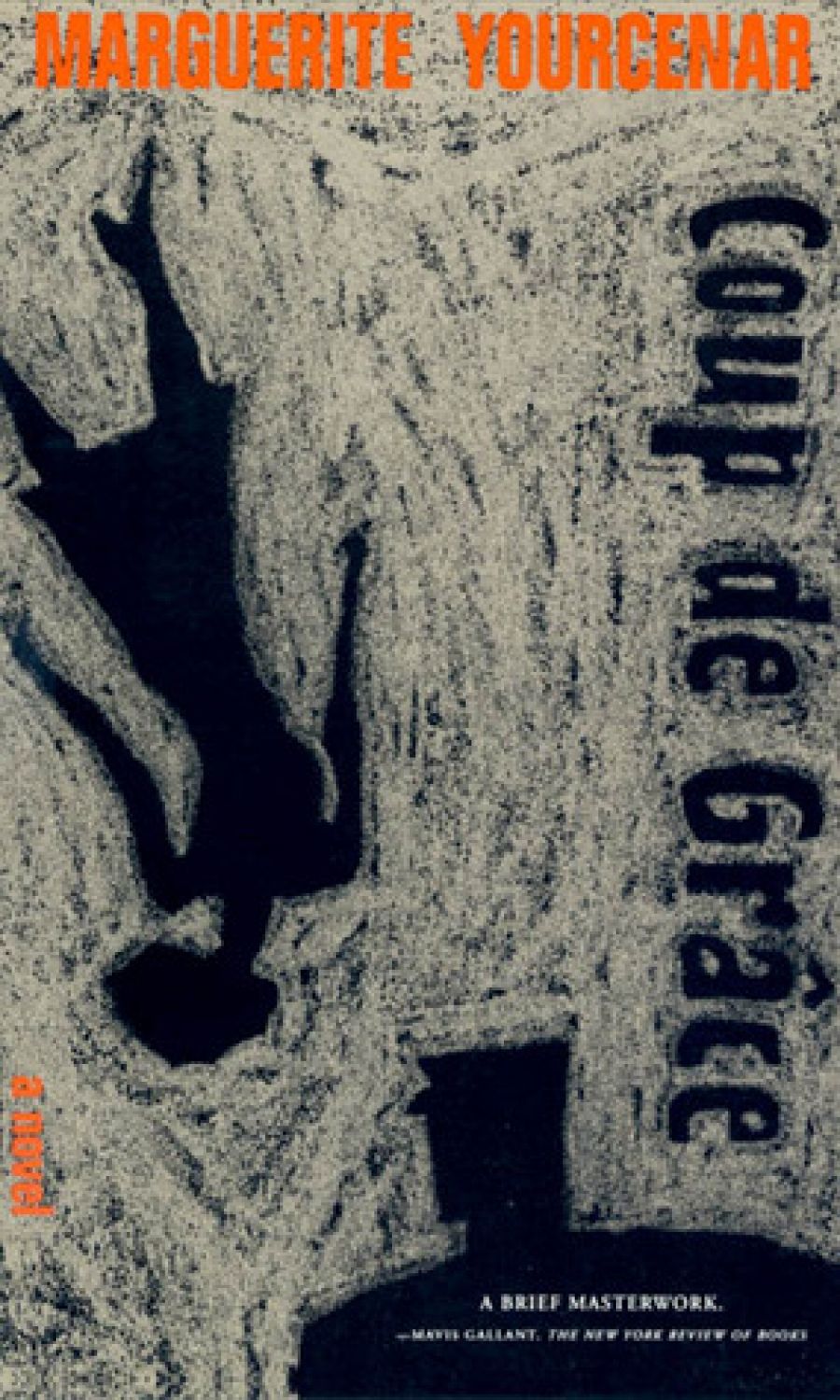
- Free Article: No
- Contents Category: Fiction
- Review Article: Yes
- Online Only: No
- Custom Highlight Text:
Originally published in French in 1939, Coup de Grâce is a subtle book, ‘a human, not political, document’ written with absolute assurance and remarkable skill. That the book is filled with a disturbing inhumanity portrayed (without irony) as nobility, makes it a disturbing experience for the contemporary reader.
- Book 1 Title: Coup de Grâce
- Book 1 Biblio: Harvill, $16.95 pb
Erick von Lhomond, a young, aristocratic German, is a soldier of fortune. Attracted to ‘any cause half-lost, half-won’, he takes part in the struggle against the Bolsheviks in what was once called Kurland. Yourcenar sets up von Lhomond to tell his story without any obvious narratorial interference. Confronted with a part psychological profile, part love-story, Yourcenar’s readers are ultimately left to make up their own minds about the protagonist’s behaviour, as well as that of the author.
As a character, Erick von Lhomond is initially attractive: he is intelligent, observant, entertaining. He is also a very capable storyteller, in the manner of a nineteenth-century novelist, and prides himself on a keen understanding of the human species, an understanding he does not fear to bring to his own actions and experiences. Such a being is the model of sophistication, and yet the man is a soldier who fights not for freedom (after his stint against the Bolsheviks, he ends up in Spain fighting under Franco) but because it is his profession. As the story progresses, von Lhomond’s actions, together with his curious capacity for detachment, take on a monstrous aspect culminating in the execution of a prisoner-of-war.
The crux of the story involves the narrator’s childhood friend and comrade-in-arms, Conrad, and Conrad’s sister, Sophie. The three of them, together with a motley array of soldiers, are holed up in an obscure town fighting a scrappy, sporadic war against shadowy enemies. Unfortunate Sophie, the only woman in this male world (there’s an aunt upstairs, but she doesn’t count), is first raped and then falls in love with von Lhomond. Von Lhomond narrates his version of the battle of the sexes – of her ardour and his fitful attraction – with all the coolness of a quantity surveyor: ‘Women’s instinctive reactions in love are so limited in number and kind that it takes no astrologer’s art to predict their course’. After such comments, the reader searches in vain for a hint of irony from the concealed author, a sign to prove that what we have here is the outmoded thinking of a cultural dinosaur (captured brilliantly) and not something Yourcenar endorses herself. The text remains unnervingly silent right to the end.
There is a Preface (which I did not read until last), and it is here that the ambiguities of the narrative become comprehensible. Yourcenar explains that one reason for choosing to write Coup de Grâce was the intrinsic nobility of the characters. In this spectacular play on words (all three main characters are members of the nobility) she declares her sympathy for von Lhomond and the world view he embodies. Only the naïve reader, she writes, ‘might make a sadist of Erick’ and condemn his complete lack of understanding of women. Fifty years down the track, I would not be surprised to find the so-called naive readers outnumbering admirers of Erick’s, and Yourcenar’s, ‘enlightened’ culture.


Comments powered by CComment